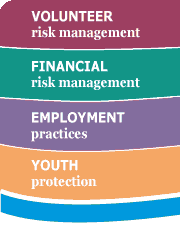Four Quick Tips to Understand Commercial Insurance Policies
1. Take Advantage of Electronic Formats — Many insurance companies now issue policies in an electronic format with headings that can be clicked on to zero in on a particular policy section or particular endorsement. This makes it much easier to navigate and review the policy.
2. Seek Assistance from Your Agent — Regardless how small or large your nonprofit is, you should expect your agent or broker to provide you with a written summary of your policy coverages, sometimes called a ‘schedule of insurance’. A detailed schedule of insurance can be an invaluable tool as you review your policies. A complete Schedule of Insurance should list your coverages, show policy limits and other basic information from the declaration pages, and list nonstandard exclusions and endorsements. You should also expect your agent to be available to answer any questions you have about your policies.
3. Monitor Changes — Reviewing and understanding a commercial insurance policy is hard enough the first time, ideally you shouldn’t have to do it every year. In most states admitted insurance companies are required to advise the insured in writing in advance of any coverage changes or a significant premium increases. You should also expect your agent or broker to advise you of any important changes in coverage. If your agent recommends changing carriers for any line of coverage, request a side-by-side coverage comparison highlighting differences between the two policy forms.
4. Know the Basics — A package policy for a small nonprofit can easily be more than 300 pages in length. Your fiduciary duty to protect your nonprofit’s mission and assets may not require that you read every word of every page of your insurance policies. And many nonprofit leaders read their policies for the first time when they have filed a claim or after receiving a letter denying coverage for a claim. At a minimum, take time to become familiar with the basic structure of your policies and the information on your Schedule of Insurance, so that you won’t be looking at the basics for the first time if a problem arises. Also, make certain you know your policy limit and key policy exclusions, especially nonstandard exclusionary endorsements. And if you have any ‘claims-made’ liability policies, take time to understand the policy reporting requirements. If you have any lingering doubt about whether and how a potential claim should be reported, contact your agent or broker without delay. Also, contact your agent or broker without delay if you note any mistakes or inaccuracies in your commercial policies, or if you have questions or concerns about any aspect of the coverage purchased to protect your nonprofit’s mission.






